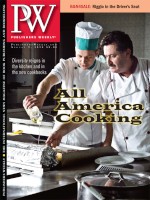Although making Barnes & Noble a publicly traded company helped to make Len Riggio a very wealthy man, the founder and chairman of the bookstore chain has never liked to operate under the spotlight that running a public company brings, one reason that over the years rumors have periodically surfaced that Riggio was considering taking B&N private. Now with a low stock price, analysts down on the future for all bookstore chains, and lots of private equity money available, the time appears right for B&N to once again become a private company, and interviews with analysts and merger and acquisition brokers found the most likely candidate to acquire B&N is Riggio himself.
"It's a no-lose situation" for Riggio, one M&A dealer said. At the very least, the decision by the B&N board to consider the sale of the company will make Ron Burkle "put up or shut up," another M&A broker said. Burkle and his Yucaipa American Management firm is B&N's second largest shareholder, and Burkle sued B&N to remove the poison pill provision the board passed, making it all but impossible for Burkle, or any outside shareholder, to acquire a stake in the company that would rival that held by Riggio and other B&N insiders. A trial was held in July and a verdict could come at any time.
One reason for Burkle's suit was that he believed B&N's shares are undervalued due in part to the stranglehold Riggio has on running the company. By putting the company up for sale, the B&N board will test to see if Burkle is really interested in paying a premium for the company—$25 per share. If he is not interested in making an offer, the question becomes how much it would take to buy him out. At $25 per share, Burkle's shares are worth about $282 million, and the cost to buy out all other outside shareholders would be $618 million. Excluding Riggio's own stock, B&N insiders hold about five million shares, which would mean another $125 million. Still, no one could buy B&N as cheaply as Riggio, who owns 17.9 million shares. "I don't see any group buying B&N that doesn't include Riggio," an M&A broker said.
If Burkle is interested in paying the $25 a share, or more, Riggio would be due at least $448 million, not a bad consolation prize if he decides to walk away from the business. But as the B&N press release indicated, Riggio would prefer to remain part of B&N's future. After maintaining a relatively low profile after he first handed the day-to-day operations of B&N to his brother, Steve, Riggio has had renewed interest in the company and was very much involved with the launch of the Nook, a device he believed would move B&N safely into the digital future.
B&N spent considerable time and effort to put on the June 29 investors conference outlining its vision for the future, but those plans, which B&N sees as a clear blueprint for growth, did not impress Wall Street, which focused almost entirely on how much the $140 million digital investment would hurt earnings in the current fiscal year. B&N's stock was selling at $13.27 per share before the presentation and had fallen to $12.84 before the Tuesday announcement about the possible sale of the company, a decline that frustrated B&N executives. Exploring a possible sale will get Burkle off the company's back about the stock price, one dealmaker said, and if nothing happens, he continued, the stock will fall, and Riggio will take the company private at $13 per share next year.
Top Barnes & Noble shareholders
| Shareholder | # of Shares | %of Total |
|---|---|---|
| Len Riggio | 17,900,132 | 29.9% |
| Ron Burkle/Yucaipa American Management | 11,291,213 | 19.2 |
| Aletheia Research & Management | 9,373,192 | 15.9 |
| Steve Riggio | 2,484,852 | 4.1 |
| Mitchell Klipper | 1,636,692 | 2.7 |



 Volume 257
Issue 31
08/09/2010
Volume 257
Issue 31
08/09/2010





